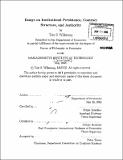Essays on institutional persistence, contract structure, and authority
Author(s)
Wilkening, Tom S
DownloadFull printable version (17.21Mb)
Other Contributors
Massachusetts Institute of Technology. Dept. of Economics.
Advisor
Sergei Izmalkov and Abhijit Banerjee.
Terms of use
Metadata
Show full item recordAbstract
This thesis is a collection of essays that uses theoretical and experimental methods to explore institutional persistence, contract structure, and authority. Chapter One studies the informational and efficiency properties of institutions that form to reduce moral hazard. While in the short run such mechanisms may be optimal, in the long run inefficient institutions may persist because information about changes in the underlying environment is lost. Using experimental and theoretical methods, it analyzes a market with high quality and low quality products that are indistinguishable without a costly certification process. Sellers in the market make endogenous production decisions and are heterogeneous in their levels of moral hazard leading to two possible equilibria-non-certifying and certifying-that vary in both efficiency and information about the underlying environment. The certifying equilibrium, which does not carry information about changes in the distribution of sellers, does not adjust when the underlying environment changes, perpetuating a market structure that makes all market participants weakly worse off. Chapter Two studies how changes in contract structure may help preserve antiquities. Most countries prohibit the export of certain antiquities. This practice often leads to illegal excavation and looting for the black market, which damages objects and destroys important aspects of the archaeological record. Chapter Two argues that many of the goals for export bans could be better accomplished through the use of long-term leases which would raise revenue for the country of origin while preserving national long-term ownership rights. Chapter Three uses experiments to study how control rights are distributed in a setting with incentive conflicts. (cont.) It shows that while effort levels are consistent with theoretical predictions, principals retain control rights even when it is strongly in their interest to delegate. Chapter Three also documents a differential response to authority by gender. As agents, women have strong fairness preferences resulting in diminished effort in asymmetric treatments but higher effort in symmetric ones. As principals, women are more likely to transfer authority when it is efficient to do so.
Description
Thesis (Ph. D.)--Massachusetts Institute of Technology, Dept. of Economics, 2008. Includes bibliographical references (p. 154-158).
Date issued
2008Department
Massachusetts Institute of Technology. Department of EconomicsPublisher
Massachusetts Institute of Technology
Keywords
Economics.